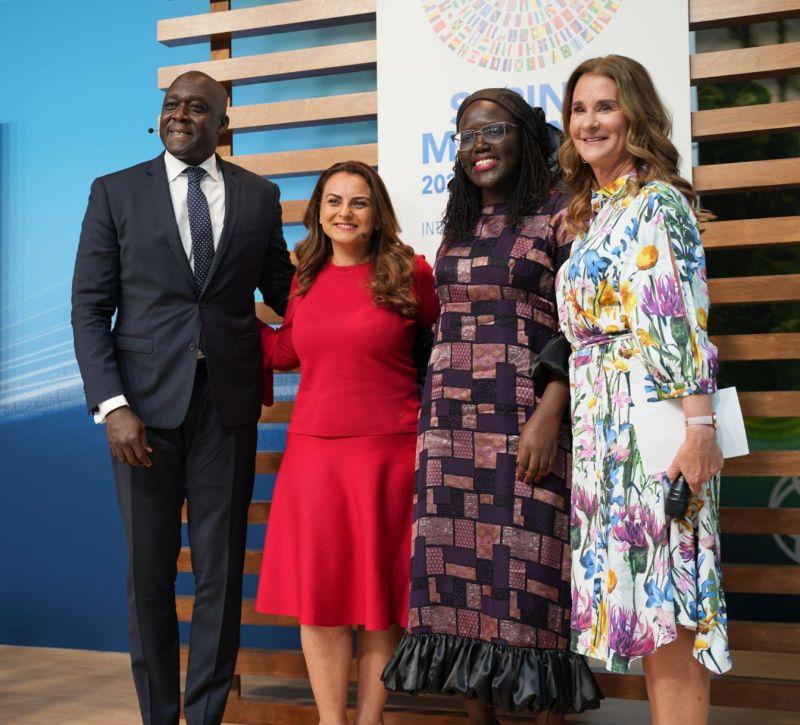Empowered Women: Reflections from Spring Meetings

The recent panel discussion at the 2023 World Bank Group and International Monetary Fund (IMF) Spring Meeting, "Expanding Opportunities for Women's Leadership," shed light on the importance of empowering women entrepreneurs and leaders. The panelists, Makhtar Diop, Managing Director, IFC; Melinda French Gates, Co-chair of the Bill & Melinda Gates Foundation; Adji Bousso Dieng, Assistant Professor of Computer Science, Princeton University, emphasized the need to increase the number of women in leadership positions and support women-owned businesses, highlighting the crucial role played by women in addressing global issues, such as climate change and fragility. A crucial point discussed during the panel was the need to increase the accessibility of financial resources for women-led businesses. The speakers highlighted the critical role played by women in addressing global challenges and the significance of providing support to financial service providers to leverage the talent and perspectives of women.
Melinda French Gates discussed the importance of investing in women as economic engines and agents of change. She highlighted the need for women to have full power and digital financial inclusion, be in leadership positions, and the importance of taking a gendered approach to fuel economies. Gates cited India as an example of a country taking a gender approach to fuel their economy by addressing women's issues throughout their lifecycle, including health, education, family planning, and workplace harassment, and providing support such as childcare, digital financing tools, and capital for women's businesses.
Makhtar Diop highlighted some crucial areas to improve women's involvement in the workforce and support women entrepreneurs. These areas include advancing technology, fair division of household responsibilities, and creating leadership opportunities for women in small and medium-sized businesses and women's associations. He emphasized that creating a supportive workplace for women and aligning with social norms to promote their economic involvement is crucial in designing gender inequality programs with desired outcomes like increased productivity, innovation, and economic growth.
Adji Bousso Dieng stressed the importance of promoting gender equality in Africa by increasing accessibility to STEM education for non-English speakers through the use of AI, as well as by providing economic support and infrastructure for women in remote areas. She highlighted the significance of developing skills in science and engineering, funding STEM education, and inspiring young African women to pursue careers in STEM fields to unlock Africa's potential.
The panel discussion highlighted the importance of expanding opportunities for women's leadership and its positive impact on societies and economies. The insurance sector, in particular, can promote gender diversity and equality by adopting a women's agenda in their work programs, which is in line with GIIF's approach to providing innovative insurance solutions for women. Through such efforts, the insurance sector could create a more inclusive and equitable industry that not only benefits women but also strengthens economies as a whole. Women's input is essential at all stages of the insurance value chain, ranging from product conception to sales, as it helps to better understand the risk mitigation concerns of female clients, including those from low-income backgrounds.
GIIF's market research found that women farmers prefer women agents who better understand their needs and challenges. Women agents can bring in their insights as professionals, mothers, and caregivers, influencing the development of insurance products. A new project, which is a collaboration between the Federation of African National Insurance Companies (FANAF), GIIF, and the IFC Women's Insurance Program (WIP), through a gender initiative, aims at promoting gender diversity and equality in the insurance industry throughout the FANAF region covering over 28 African countries. This project is crucial in promoting policy reform for gender equality, particularly in management roles in Africa's insurance sector. It is expected that increasing the number of women in the industry will not only level the field for women in this business line but will also support a gender lens across policy design and distribution through women's insights and perspectives on challenges faced by women.
